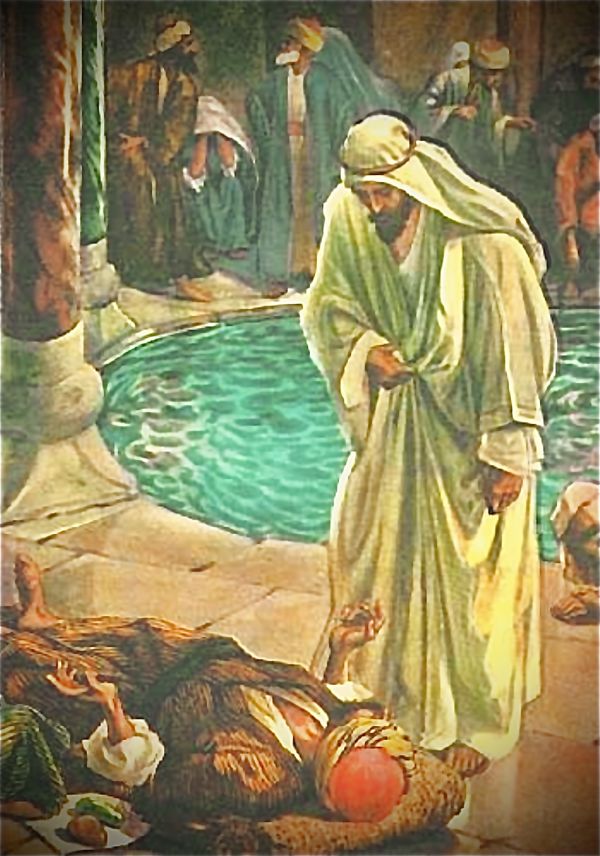(Jn 5:1-3.5-16)
In the ‘devotion’ of competitive trophies, only the quickest heals, not the neediest.
Jesus prefers to transgress the law than to align himself with the merciless world that marginalizes the wretched.
In the holy places the cult of sacrifices required a lot of water [for the animals to be washed, then slaughtered], especially in the great feasts.
Large cisterns collected rainwater, and public baths agglomerated the sick waiting for help or recovery.
The pools outside were used to clean the lambs before the sacrifice to the Temple, and this old practise gave the water itself an aura of healing sanctity.
Many sick people flocked to bathe in the «motion of the water» [v.3: perhaps due to an intermittent source].
It was said that an angel stirred the waters of the popular baths and that the first person to enter them in the one moment the same waters became restless would be healed.
Symbol of a religion that offers false hopes to the excluded masses.
Vain expectations attracted the imagination of the sick who didn’t know the man-God of their destiny.
«But he who had been healed did not know who He was, because Jesus had gone away, there being crowd in that place» (v.13).
The Face of the Son is unrecognisable in the masses pressing around, which is only distracting and content with habitual, exaggeratedly solemn forms.
Abundant conducts purified the Temple and neglected the people. The water flowed, but didn't cure anyone - on the contrary, it made the situation worse.
An icon of a rich and miserable religiosity: vain, useless, harmful; that abandons those it’s called upon to support.
Scribes taught the law to students in the sacred precincts, and the rabbis received clients under Solomon's porch: at the top the Torah and its trade, at the bottom and outside - close by - the treachery of the poor.
Official institution kept the unsteady at a safe distance, revealing only a ridiculous and brutal caricature of the Father's friendly, hospitable and sympathetic Face.
Crowd of the needy who were given ‘magic’ water [only randomly and by surprise] is a parable of destitute humanity, dramatically lacking everything - even genuine spiritual comfort.
On the other hand, Jesus approaches them on his own initiative (vv. 6.14).
And gets involved - at the risk of his life - with those who are most alone, awkward and clumsy; unables even to receive miracles.
We are ‘sent’ not to deserving and self-sufficient, but to those who aren’t able to use their ownn means to come forward.
Christ himself does not work in order to be recognized and acclaimed: «He had gone away» (v,13). Nor does He care for us, only to trigger a religious conversion.
He heals by perceiving the need, not so that the sick person ‘believes in God’.
We leave people free to go through their seasons, not stereotypes.
We enter the heart of Lent.
[Tuesday 4th wk. in Lent, April 1st, 2025]












